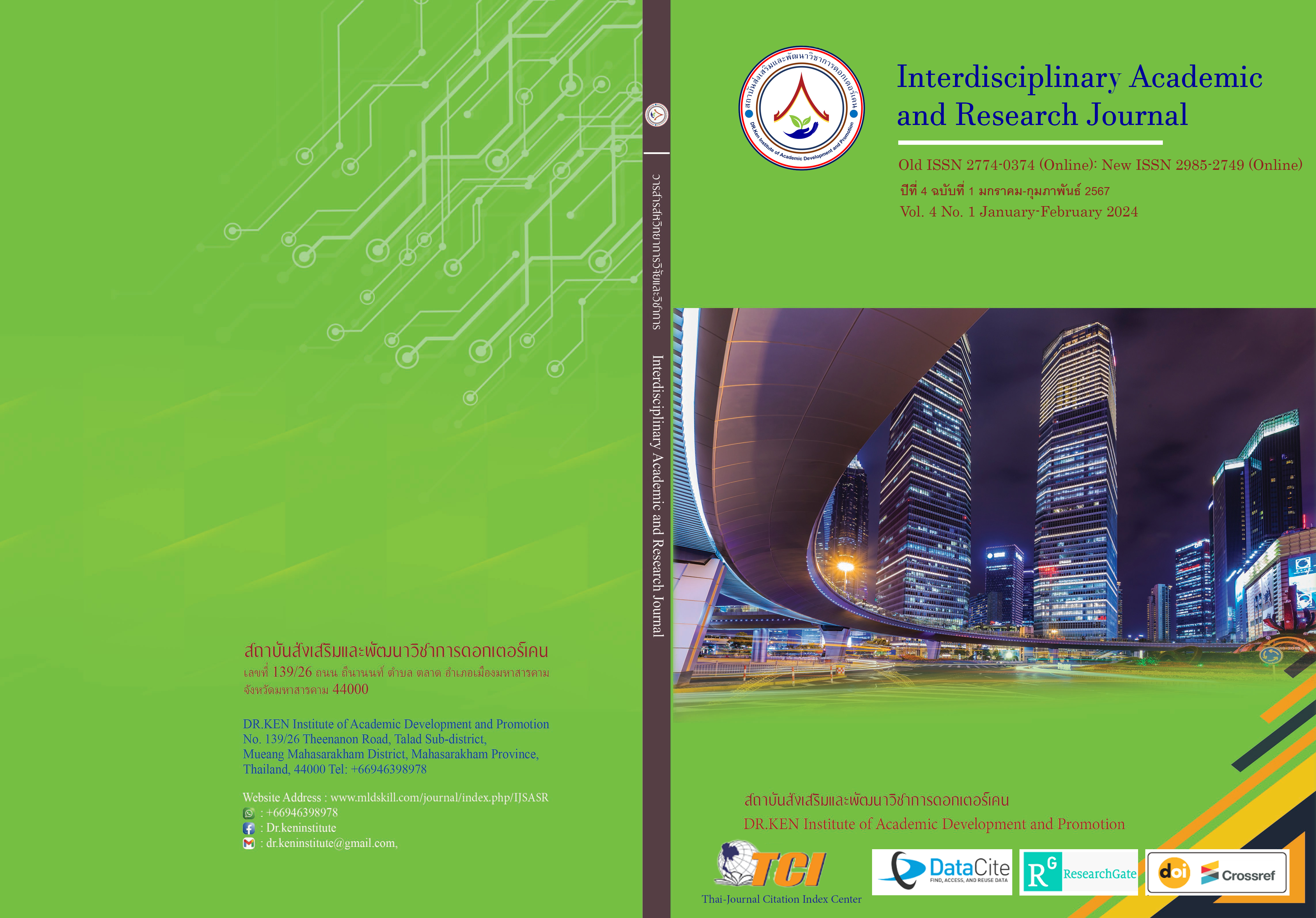The Problem-Based Science Learning Management on Work and Energy to Develop Integrated Science Process Skills of Grade 10 Students
DOI:
https://doi.org/10.60027/iarj.2024.270797Keywords:
Problem-based Learning Management;, Integrated Science Process Skills; , Learning AchievementAbstract
Background and Aims: Organizing learning using a problem-based model is a teaching and learning environment that uses problems to help students learn and gain knowledge according to the goals. The teacher will give examples of situations that are real problems in teaching and practice the process of analyzing problems and solving problems together as a group. This will help students understand the problem clearly. Thus, this research aimed to achieve two objectives: 1) to compare the integrated science process skills of grade 10 students before and after implementing problem-based learning management on the topic of work and energy, and 2) to assess the learning achievement in work and energy for grade 10 students using problem-based learning, with a criterion of 70 percent as the benchmark.
Methodology: the study involved 16 students from grade 10 at Rajabhat Maha Sarakham University Demonstration School during the second semester of the academic year 2022. The research tools included six problem-based learning management plans focusing on work and energy, an assessment form for integrated science process skills comprising two items with scoring rubrics, and an achievement test on work and energy consisting of 20 items.
Results: 1) The integrated science process skills of grade 10 students significantly improved after receiving problem-based learning management at the statistical significance level of .05. 2) The learning achievement of grade 10 students after studying was higher than the criteria of 70 percent with a statistical significance at the .05 level.
Conclusion: The problem-based learning management made the integrated science skills of Mathayom 4 students statistically better and their academic achievement increased at the .05 level of statistical significance, especially the science process skills.
References
กระทรวงศึกษาธิการ. (2551). หลักสูตรแกนกลางการศึกษาขั้นพื้นฐานพุทธศักราช 2551. กรุงเทพฯ: กระทรวงศึกษาธิการ.
กระทรวงศึกษาธิการ. (2553). หลักสูตรแกนกลางการศึกษาขั้นพื้นฐาน พุทธศักราช 2551 พิมพ์ครั้งที่ 3 กรุงเทพฯ: โรงพิมพ์ชุมนุม สหกรณ์การเกษตรแห่งประเทศไทย จำกัด.
กระทรวงศึกษาธิการ. (2560). ตัวชี้วัดและสาระการเรียนรู้แกนกลางกลุ่มสาระการเรียนรู้วิทยาศาสตร์ (ฉบับปรับปรุง พ.ศ. 2560) ตามหลักสูตรแกนกลางการศึกษาขั้นพื้นฐานพุทธศักราช 2551. กรุงเทพมหานคร : โรงพิมพ์ชุมนุมสหกรณ์การเกษตรแห่งประเทศไทย.
เกริก ศักดิ์สุภาพ (2564). การพัฒนารูปแบบการจัดการเรียนรู้เชิงรุกวิชาฟิสิกส์โดยใช้ปัญหาเป็นฐานเพื่อเสริมสร้าง ทักษะการแก้ปัญหาและผลสัมฤทธิ์ทางการเรียนของนักเรียนระดับชั้นมัธยมศึกษาปีที่ 4. วารสารศึกษาศาสตร์ มหาวิทยาลัยบูรพา. 32 (1), 46-60.
ทิฆัมพร สมพงษ์ และคณะ. (2559). การบริหารโรงเรียนในสังคมพหุวัฒนธรรมในสามจังหวัดชายแดนภาคใต้. วารสารหาดใหญ่วิชาการ, 14(1), 97-107
ทิศนา แขมมณี. (2555). ศาสตร์การสอน : องค์ความรู้เพื่อการจัดการกระบวนการเรียนรู้ที่มีประสิทธิภาพ. พิมพ์ครั้งที่ 6. กรุงเทพฯ : สำนักพิมพ์แห่งจุฬาลงกรณ์มหาวิทยาลัย.
ทิศนา แขมมณี. (2560). ศาสตร์การสอน: องค์ความรู้เพื่อการจัดกระบวนการเรียนรู้ที่มีประสิทธิภาพ. พิมพ์ครั้งที่ 8. กรุงเทพฯ: แห่งจุฬาลงกรณ์มหาวิทยาลัย.
ปัณฑารีย์ ถาวรศักดิ์, ทวีศักดิ์ จินดานุรักษ์ และ ชำนาญ เชาวกีรติพงศ์. (2566). ผลการจัดการเรียนรู้โดยใช้ปัญหาเป็นฐาน เรื่อง ฟิสิกส์นิวเคลียร์ที่มีต่อผลสัมฤทธิ์ ทางการเรียนและความสามารถ ในการแก้ปัญหาทางวิทยาศาสตร์ของนักเรียน ชั้นมัธยมศึกษาปีที่ 6 โรงเรียนราชประชานุเคราะห์ 15 (เวียงเก่าแสนภูวิทยาประสาท) จังหวัดเชียงราย. วารสารศึกษาศาสตร์ มหาวิทยาลัยบูรพา. 34 (2), 43-55.
ไพศาล วรคำ. (2564). การวิจัยทางการศึกษา. กรุงเทพฯ: สำนักพิมพ์แห่งจุฬาลงกรณมหาวิทยาลัย
ภพ เลาหไพบูลย์. (2542). แนวการสอนวิทยาศาสตร์. พิมพ์ครั้งที่ 3. กรุงเทพฯ : ไทยวัฒนาพาณิชย์.
รุจิกะ การิสุข. (2554). การพัฒนาความเข้าใจเรื่องแรงและการเคลื่อนที่ของนักเรียน ชั้นมัธยมศึกษาปีที่ 4 ด้วยการจัดกิจกรรมการเรียนรู้แบบทํานาย-สังเกต-อธิบาย. วิทยานิพนธ์ปริญญาวิทยาศาสตรมหาบัณฑิต: มหาวิทยาลัยอุบลราชธานี.
วรรณทิพา รอดแรงค้า. (2544). การสอนวิทยาศาสตร์ที่เน้นกระบวนการ. พิมพ์ครั้งที่ 2. กรุงเทพฯ: สถาบันพัฒนาคุณภาพวิชาการ (พว.).
วิไลลักษณ์ โภคาพานิชย์. (2559). การพัฒนาทักษะกระบวนการทางวิทยาศาสตร์ เรื่อง แรง การเคลื่อนที่ และพลังงาน กลุ่มสาระการเรียนรู้วิทยาศาสตร์ ชั้นมัธยมศึกษาปีที่ 3 โดยการจัดการเรียนรู้แบบใช้ปัญหาเป็นฐาน. วารสารวิชาการหลักสูตรและการสอน มหาวิทยาลัยราชภัฏสกลนคร, 8(22), 135-145.
สถาบันส่งเสริมการสอนวิทยาศาสตร์และเทคโนโลยี. (2524). ทักษะกระบวนการทางวิทยาศาสตร์. กรุงเทพฯ: สถาบันส่งเสริมการสอนวิทยาศาสตร์และเทคโนโลยี.
สำนักงานเลขาธิการสภาการศึกษา. (2550). รูปแบบการจัดการเรียนรู้เพื่อพัฒนาความสามารถ ของเด็กในการอ่าน คิด วิเคราะห์ เขียน และสร้างองค์ความรู้ด้วยตนเอง โดยเน้นผู้้เรียนเป็นสำคัญ. กรุงเทพฯ : สำนักงานฯ.
สำนักงานเลขาธิการสภาการศึกษา. (2551). กรอบทิศทางการพัฒนาการศึกษาในช่วงแผนพัฒนาเศรษฐกิจและสังคมแห่งชาติ ฉบับที่ 10 (พ.ศ. 2550-2554) ที่สอดคล้องกับแผนการศึกษาแห่งชาติ (พ.ศ. 2545-2559): ฉบับสรุป.กรุงเทพฯ: สกศ.
Adadan, E., Irving, K. E., & Trundle, K. C. (2009). Impacts of multi-representational instruction on high school students’ conceptual understandings of the particulate nature of matter”, International journal of science education. 31(13), 1743-1775.
American Association for the Advancement of Science. (1989). American Association for the Advancement of Science Project 2061. Science for All Americans. Washington, DC: AAAS.
Bloom, Benjamin S. (1976). Taxonomy of Education Objective, Handbook I: Cognitive Domain. New York: David Mckay.
The Institute for the Promotion of Teaching Science and Technology. (2003). Handbook of Mathematics Learning Substance. Bangkok: The Institute for the Promotion of Teaching Science and Technology.
Downloads
Published
How to Cite
Issue
Section
License
Copyright (c) 2024 Surirat Kalong, Paisarn Worakham

This work is licensed under a Creative Commons Attribution-NonCommercial-NoDerivatives 4.0 International License.
Copyright on any article in the Interdisciplinary Academic and Research Journal is retained by the author(s) under the under the Creative Commons Attribution-NonCommercial-NoDerivatives 4.0 International License. Permission to use text, content, images, etc. of publication. Any user to read, download, copy, distribute, print, search, or link to the full texts of articles, crawl them for indexing, pass them as data to software, or use them for any other lawful purpose. But do not use it for commercial use or with the intent to benefit any business.
















.png)


